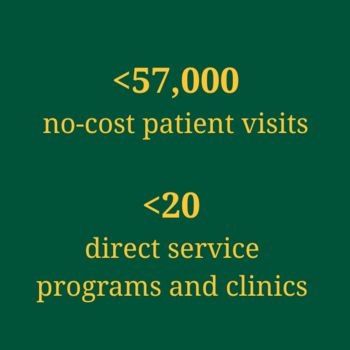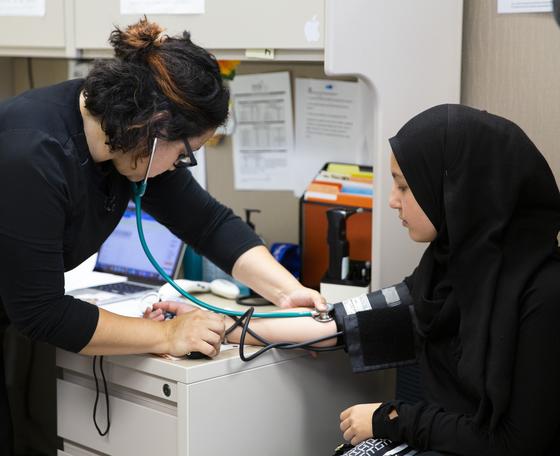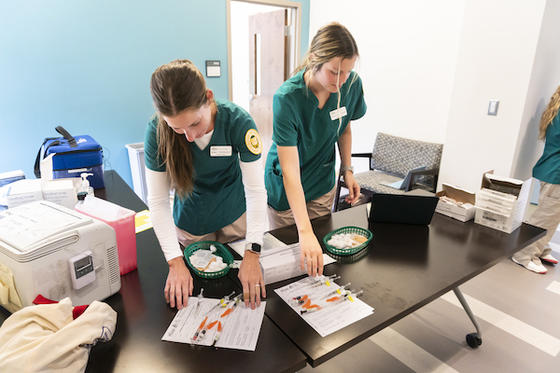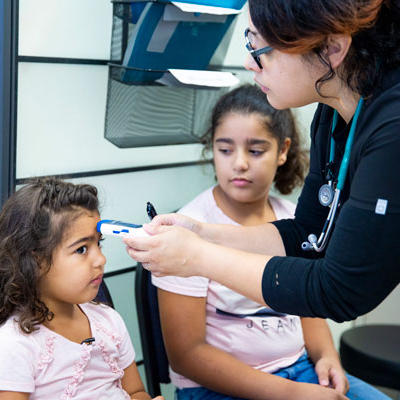By Rebecca Sutter
Rebecca Sutter, professor of nursing and director of the Mason and Partners (MAP) Clinics reflects on the 10th Anniversary of the clinics she co-founded. A doctorally trained and credentialed family nurse practitioner and George Mason University alumna, she now oversees more than 20 MAP direct service programs and clinics. Sutter has worked tirelessly over her career to break down barriers to health care in medically underserved areas and for those who may not have access to health care otherwise.
The MAP Clinics at a Glance

Since the College of Public Health’s Mason and Partners Clinics first opened in 2015, we have delivered more than 57,000 no-cost patient visits to uninsured and underserved individuals across Virginia. What began as a single site in Manassas, Virginia, has grown into a statewide safety net, now spanning more than 20 direct service programs and clinics that reach into shelters, schools, jails, and other under-represented communities. We have welcomed more than10,000 new patients with open arms.
A University-Anchored Care Model
At the core of the MAP Clinics is a university-anchored care model. Licensed nurse practitioners, registered nurses, social workers, counselors, pharmacists, and other interprofessional team members work side-by-side with students from George Mason University’s nursing, public health, social work, counseling, and health informatics programs. This interprofessional approach is unique and ensures that every patient visit includes holistic, integrated care and is a clinical learning opportunity for students. The model builds a skilled and compassionate future health workforce.
One of the MAP Clinic’s defining strengths is its responsiveness. The model allows us to identify emerging community needs and implement thoughtful, sustainable solutions. From responding to public health crises to addressing behavioral health gaps and refugee care, MAP has consistently evolved to meet the most urgent needs of the communities it serves.
Meeting Community Needs Across Virginia

The early MAP sites in Manassas and Culmore have completed more than 17,000 and 4,600 visits respectively, primarily serving uninsured, predominantly non-English-speaking patients with a focus on chronic disease management.
In 2017, MAP partnered with Fairfax County Public Schools (FCPS) to open a pediatric clinic to remove school-entry barriers for children. Since then, MAP has completed more than 8,200 school and sports physicals and 7,100+ immunization and TB screening visits. In coordination with FCPS, the clinics have completed more than 6,400 visits, helping ensure no child is kept out of school due to unmet health care needs.
Addressing Public Health Crises
Beyond day-to-day care, MAP has also risen to the challenge of public health crises. As the opioid crisis escalated, MAP responded by launching a comprehensive opioid use disorder program. This included both community-based medication for opioid use disorder and a jail-based initiative in partnership with the Prince William County Adult Detention Center. Together, these programs delivered more than 7,500 visits in the community and more than 2,800 in jails. The jail-based program is considered a trailblazing model in Virginia, helping expand access to addiction care for incarcerated individuals.
When the COVID-19 pandemic began in March 2020, MAP responded immediately. The team became one of the region’s earliest community testing and vaccination hubs, testing more than 5,000 individuals and vaccinating several thousand more through mobile outreach and neighborhood-based efforts.
Reducing Barriers to Care

MAP also filled a critical gap in care for individuals experiencing homelessness. More than 1,200 shelter-based visits were completed, bringing care directly to unhoused patients. To further reduce barriers, MAP conducted more than 1,500 telehealth visits, to reach patients who faced transportation, language, or mobility challenges.
Recognizing the need for increased mental health access in the community, particularly due to healthcare provider shortage areas they are serving, MAP clinics responded by expanding to provide mental health services as well. MAP has since delivered more than 600 mental health visits.
To reinforce long-term health education, MAP launched a nurse-led follow-up program that completed more than 230 chronic care education visits. A licensed pharmacist also provided more than 500 medication and disease education sessions.
In response to the evolving needs of refugee communities, MAP created culturally tailored care models, including a specialty Afghan refugee clinic. These efforts were supported by multilingual community health workers and interpreters and included both acute care and chronic disease management.
Today and the Road Ahead
Today, MAP continues to serve underserved populations across Northern Virginia, with core sites in Manassas, Falls Church, and Fairfax. Bridge-care and peer recovery programs have also extended MAP’s reach into Chesterfield, Petersburg, and Norfolk. Across clinics, MAP serves a diverse population with services ranging from lab testing and vaccinations to behavioral health, medication management, chronic disease education, and addiction treatment.
This work is made possible by support from federal, state, and local partners including Health Services and Resources Administration, Centers for Disease Control, Substance Abuse and Mental Health Services Administration, the Potomac Health Foundation, Northern Virginia Health Foundation, and George Mason University.
As we reflect on the past decade, the college’s MAP clinics stand as a model for what health care can look like when it is rooted in equity, powered by education, and responsive to the evolving needs of the communities it serves. We are proud of what has been built and deeply committed to continuing this mission in the decade ahead.
